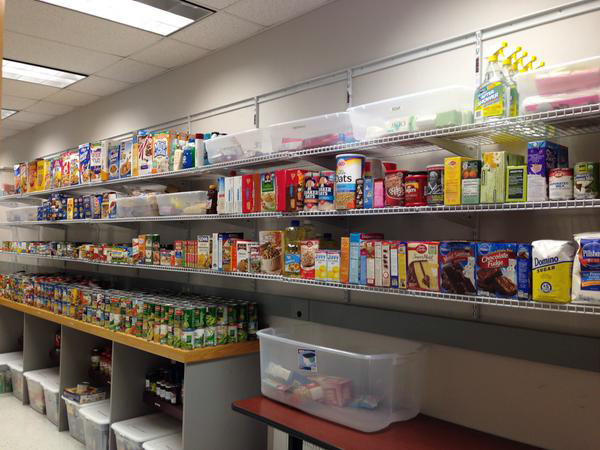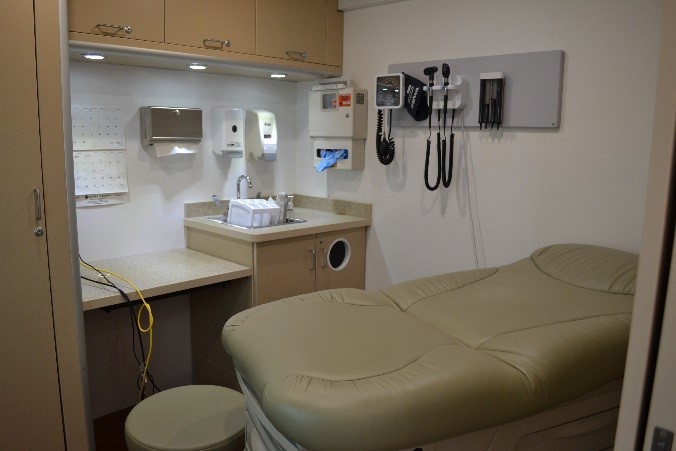Norwalk Community College: Serving Students' Hidden Needs
Many Norwalk Community College (NCC) students work full-time and care for their families while attending college. It's a constant juggling act with hurdles to overcome, including taking care of sick children, squeezing in study time between doctor's appointments, and coping with rising food costs.
NCC realizes that having determination and a sterling work ethic aren't enough for some students to succeed. That's why, in addition to the requisite financial aid and career services, NCC offers two uncommon support services that provide students with free medical care and free groceries, right on campus.
During the 2014-2015 academic year, the college established a free food pantry for students and their families and partnered with a local community health center to bring the Health on Wheels (HOW) mobile medical van to campus.

Free Food Pantry
Some NCC students are faced with hunger and/or food insecurity, which may force them to choose between buying textbooks or buying groceries. Realizing that hunger hinders learning, the college opened a free food pantry in February of this year.
More than 4,000 non-perishable food, household, and personal care items are available to students with a valid NCC ID. No questions asked, and no forms to fill out. The items most in demand are cereal, coffee, diapers, detergent, and cooking supplies. In addition, while at the food pantry students are able to access the ConneCT Live system to apply for state and federal benefits.
Faculty, staff, and students make donations to keep the shelves stocked and the college has held donation drives with the Stop and Shop grocery chain and the Norwalk Symphony Orchestra.
"Every item makes a difference to someone—from the student who came in because she spent the night in her car and wanted to grab a toothbrush and toothpaste to feel more confident showing up to class, to the student who said he saves $60 a month by accessing the pantry, which has allowed him to work one less shift and study more," said food pantry organizer Rachel DiPietro, an AmeriCorps Vista Volunteer and NCC alumna (class of 2012).
NCC's food pantry has been so successful that just four weeks after its opening, the college was named as one of four colleges nationwide to receive a $500 Innovation Through Collaboration grant award for service learning projects from kynamatrix Research Network, a nonprofit organization.
Research has shown that the rates of food insecure community college students exceed the national average and that this problem has a negative effect on student GPA, energy levels, and concentration, said DiPietro. In Fairfield County, where NCC is based, one in five residents lives in poverty and one in 10 families struggles with food insecurity, leaving them unsure where their next meal is coming from. NCC's food pantry is just one college effort to address student needs and improve retention and success.

Free Health on Wheels Bus
Every Thursday, a long bus, provided by the Norwalk Community Health Center, rolls up to the NCC campus and parks outside.
The Health on Wheels (HOW) bus is a mobile medical unit that offers free medical and mental health services to students and their families, including pediatric and adult healthcare, dental care, flu shots, substance abuse counseling, immunizations, preventive care, and prescriptions. Appointments are not necessary and walk-ins are welcome.
The roomy bus features an examining room, dental office, and private office for mental health consultations. It has all the equipment and medications found in a regular clinic, including rabies vaccines (an added precaution for the college's Veterinary Technician program students).
"Every member of the NCC community is welcome to visit the Health on Wheels bus, including undocumented students and the uninsured," notes David Stayner, Ph.D., a senior consultant for the Norwalk Community Health Center.
The federally funded HOW Bus is staffed by a registered nurse, a nurse practitioner, a licensed clinical social worker, and a dentist (as needed), as well as NCC graduates Maritza Ruin, community outreach coordinator, and Jose Rodriguez, medical assistant.
Patients without health insurance are never turned away, and the medical staff advise them about their eligibility for healthcare benefits. Those with health problems requiring a specialist get expedited appointments with local physicians or are transferred to the local hospital.
"We are removing the barriers that get in the way of seeking and getting help. It's private and confidential, and you can get access to low-cost prescriptions," Dr. Staynor said.
This community health partnership with a college is the only one of its kind in Connecticut.










